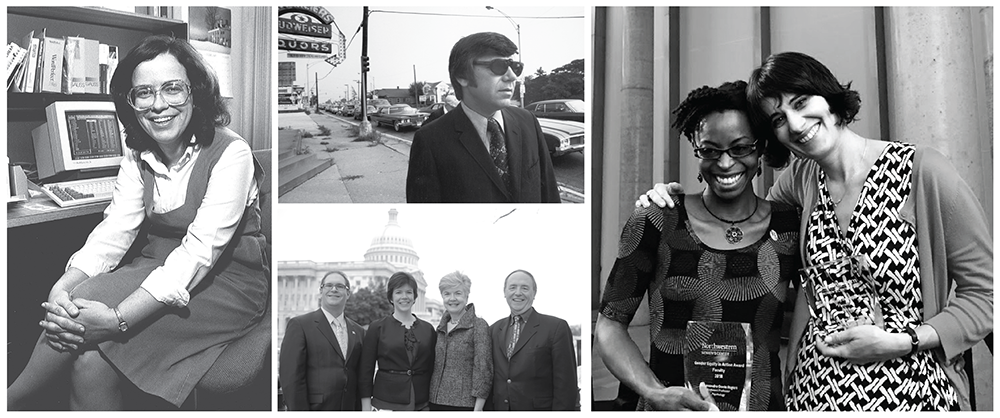50 Years of Research Excellence and Policy Impact
Institute to highlight innovative research directions at spring conference
Get all our news

From left, clockwise: Economist Rebecca Blank in the 1990s, now Chancellor of the University of Wisconsin-Madison; political scientist Lou Masotti, IPR's second director, in Chicago in the 1970s; IPR developmental psychologist Onnie Rogers (left) and IPR education sociologist Simone Ispa-Landa in Evanston in 2018; (from left) IPR economists David Figlio and Diane Whitmore Schanzenbach, then-IPR Director Fay Lomax Cook, and IPR social psychologist Thomas Cook in Washington, D.C. in 2010.
1968 brought us the Vietnam War and the Chicago Democratic Convention, student protests and political assassinations, Apollo 8 and Star Trek. It was a time of revolution, both social and political.
In the fall of that remarkable year, a small group of Northwestern scholars launched its Center for Urban Affairs—now the Institute for Policy Research (IPR)—to bring researchers together across different disciplines to shed light on issues of urban poverty and social disparities.
Many of the same issues that motivated researchers in 1968 still exist today, from poverty and discrimination to education and health inequality. In the 50 years since, though, how we think about such issues has evolved, as has IPR.
The Institute has grown from 12 to more than 150 faculty researchers encompassing more disciplines than before. Poverty, for example, is no longer examined just by economists and sociologists, but also by anthropologists, psychologists, and biologists, providing a more comprehensive understanding.
Yet IPR has stayed the course in one key area: Its faculty researchers continue to bring methodological rigor and research-driven insights to their examinations of social issues. Their research, as always, seeks to provide a strong foundation of evidence for political and intellectual leaders working to create healthy and equitable societies and opportunities for all.
Then, as now, fact-based policies matter in improving lives.
“IPR’s brand of interdisciplinary research is as much in need in 2018 as it was in 1968, and our award-winning faculty researchers continue to forge ahead,” said IPR Director and economist Diane Whitmore Schanzenbach.
Fostering an Interdisciplinary Research Community
From its start, IPR researchers have conducted research that creates new ways of thinking about and addressing social issues. Their research has broken new ground in studies of poverty and housing discrimination, crime and policing, and welfare reform and education policy.
IPR has been focused on bringing together researchers across disciplines from the beginning, according to Raymond Mack, the Institute’s first director.
“We needed to be addressing urban problems and expediting teaching, research, and action on those issues—something not easily done within a departmental framework,” Mack said at IPR’s 40th anniversary conference in 2009. Mack passed away in 2011.
This interdisciplinary approach remains a hallmark of IPR research and its community. Its Monday colloquia series, named in honor of its longest-serving director, social policy expert Fay Lomax Cook, are a weekly highlight for its researchers who come together from across the university to discuss and debate their colleagues’ research.
The Monday talks acted as a catalyst for IPR political scientist Daniel Galvin’s current research on wage theft.
“In their studies of urgent social problems, my IPR colleagues inspired me with their creative use of sophisticated quantitative and qualitative methods to pinpoint the social, economic, and political consequences of diverse policy interventions,” Galvin said.
IPR has provided an interdisciplinary home to many of the nation’s leading social policy scholars at one point over their careers, including economists Greg Duncan and Rebecca Blank, social psychologist and 2015 MacArthur Fellow Jennifer Richeson, and sociologists Paula England and Kathryn Edin (PhD '89)—not to mention cohorts of intellectually curious graduate students.
IPR’s graduate research assistants have gone on to establish themselves in academic and policy careers, and in some cases both. Counted among them are sociologist Stefanie Deluca (PhD '02), social policy scholar Katherine Magnuson (PhD '02), political scientist Toby Bolsen (PhD '10), and economist Aaron Sojourner (PhD '09).
"IPR helped me learn about a wide variety of issues and the ways different disciplines can contribute to understanding them," Sojourner said. "It created a community centered on policy-relevant research that I really enjoyed, that helped me appreciate how to apply abstract theoretical and empirical tools I learned in courses to particular, real-world contexts." Sojourner is an associate professor at the University of Minnesota’s Carlson School of Management and also served on the White House Council of Economic Advisers from 2016–17.
Taking Stock of IPR at 50
“As we discussed how to mark the occasion of IPR’s half century of research and policy impact, we wanted to focus on some of the new and exciting research directions that our faculty are leading and the policy-relevant research that will shape the next 50 years,” said IPR political scientist Laurel Harbridge-Yong, who with IPR economist Kirabo Jackson is leading the committee to organize IPR’s 50th anniversary celebration.
IPR will host a two-day conference in spring 2019 on Northwestern's Evanston campus. Six interdisciplinary panels will highlight faculty research on neighborhood inequality, policy measurement, consequences of social division, government spending, social determinants of health, and community partnerships.
The conference will feature a keynote by Princeton sociologist Matthew Desmond, a 2015 MacArthur Fellow and author of the 2017 Pulitzer prize-winning book Evicted: Poverty and Profit in the American City.
Across the year, IPR will also hold special events to mark the occasion, including lectures by three of its former graduate research assistants, and special programming for undergraduates.
More details about the IPR at 50 Conference will be coming soon. Sign up for updates here.
Published: November 2, 2018.